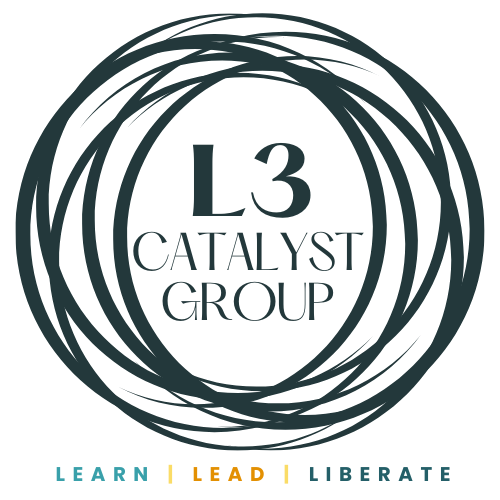It was 8:07 AM and I was running late, having hit the snooze too many times and snapped at the kids when they were lagging. Classic morning struggle. As I stepped into the car I muttered, “I’m just so tired.” But deep down, I knew the truth: I was in a dark place, and I didn’t want to admit it.
Later that day, a colleague gently called me in for presuming my truth was true for everyone. Cue the internalized shame.
We all say we want to grow...until growth comes wrapped in feedback that stings. Especially when we're exhausted and spent.
This post is about what happens when we drop the mask, meet the mirror, and stay in the messy discomfort long enough to be open to feedback.
Let’s talk about how we receive feedback—especially the kind that catches us off guard and asks us to choose growth over defensiveness.

The Mirror and the Mess: How to Stay Open When Feedback Hurts
We all like to think we’re one of the good ones.
My mentor Tovi encourages us to Love Anyway, believing that most people are doing the best they can with what they’ve been given. is often a healthy, compassionate posture.
Extending that compassion to myself as well has been the most difficult...and rewarding...part of this journey.
Note: This does NOT EXCUSE for harmful, oppressive, cruel, or abusive behavior. That's NOT what I'm addressing here.
But what happens when we’re the ones who mess up?
What happens when...
We say we value equity, but we exclude someone?
We say we love Jesus, but we act from ego and dogma, excluding and harming, not loving?
We pride ourselves on being part of an amazing organization, but hear that we've caused real harm?
What happens when we hear painful feedback about a place, team, or mission we have invested in with our whole hearts?
We flinch. We deflect. We deny.
We want to explain, defend, justify.
It’s human.
But it’s also avoidant—and avoidance kills growth.
We all have gaps in understanding. When someone gives us difficult feedback—especially across lines of race, gender, sexuality, or power—it can often land in our blind spot. Our first instinct may be to protect our image, justify our good intentions, or disprove the harm.
But self-protection isn’t the same as accountability.

A Personal Story of Messing Up
A few years ago, I was in an executive leadership team meeting with colleagues. In an effort to be inclusive, I occasionally asked a colleague—who held a marginalized identity different from my own—what she was thinking when she hadn’t spoken yet. I was curious about her perspective.
Eventually, she pulled me aside and said:
“I have some hard feedback to share with you. Please stop asking me what I'm thinking during meetings. I’ll share when I want to. When you call on me like that, it feels like I’m being put on the spot—and it’s not helpful.”
I was stunned. My intention had been good. I wanted to communicate that her voice mattered. I was trying to be open and curious.
But it wasn’t received that way. And that's what mattered.
I took a deep breath. I apologized and told her I wouldn’t do it again.
Then, later, I called a friend—someone who could hold space me falling apart and finding my footing in the swirl of emotions that came up: fear, defensiveness, even shame.
I'm grateful for those that had previously taught me NOT to share my justification, defensiveness, or good intention with the person I'd just harmed. That would have put the labor back on her. It was my work to do.
I had to sit with the feedback. Hold it. Breathe through it. Let go of the need to be seen as "good." I worked to embrace the fact that she'd given me a gift in telling me the truth about herself. Eventually, I returned to my colleague with genuine curiosity and appreciation. Our relationship wasn’t perfect; but I grew in learning to accept that I'd been wrong...without falling apart.
I'll admit that I was more guarded with her after that. I wish that wasn't true.
Consider an example of a time you received hard feedback. How did you react? What growth opportunities arise for you to sit with it. What could you learn from it?
The Gap Between Values and Impact
Many of us cling tightly to the aspiration of who we are—personally or organizationally. We craft values statements, say the right things, hire the DEI consultant and call it people and culture development. We want to be liberatory, inclusive, anti-racist, ethical, spiritual, values-driven.
But when someone gives us honest feedback that the impact doesn’t match our intentions?
It can feel like a threat to our identity, our belonging, and our sense of worth.
So we shut down or double down.
But what if difficult feedback is not a threat, but a mirror—an invitation?

Seeing What We Can’t See: The Johari Window
The Johari Window is a tool that helps us understand what’s known and unknown about ourselves. It has four quadrants:
-
Open Self – What I know about myself and others know too
-
Hidden Self – What I know but keep hidden
-
Blind Spot – What others see in me that I can’t see
-
Unknown – What neither I nor others know yet
Difficult feedback often lands in the Blind Spot. It exposes something we didn’t know—or couldn’t admit—about ourselves or our organization.
Expanding the “Open” quadrant means shrinking the blind spots. That takes humility, relationships built on trust, and a deep willingness to learn.
How Do We Receive Hard Feedback and Grow From It?
These five practices are backed by research and experience to help us stay open and curious in the face of tough feedback:
1. Regulate Before You React
Difficult feedback often activates the nervous system. Your body may interpret it as danger.
Pause. Breathe. Notice.
Try: “I feel defensive right now. I need a moment to take this in.”
Resource: Polyvagal Theory (Porges, 2011) teaches us that we can’t connect or learn when we’re dysregulated. Co-regulation and self-awareness help create safety for reflection.
2. Assume Goodwill and Shared Purpose
While not all feedback is given with care, most people offering hard truths want to see change—not just criticize.
Ask yourself: “What might be true here, even if it’s hard to hear?”
Try: “What is this person hoping for by sharing this with me?”
Resource: Thanks for the Feedback by Stone & Heen (2014) highlights how feedback often triggers identity pain—but staying curious opens doors to transformation.
3. Ask Clarifying Questions, Not Defending Ones
Don’t rush to respond with “I didn’t mean that.” Instead, ask to understand.
Try asking:
“What made you feel excluded?”
“Can you share more about the impact that had?”
“What would repair or accountability look like to you?”
This posture invites dialogue, not defensiveness.
4. Do Your Own Work Before Demanding Emotional Labor
If someone gives you feedback, thank them—then take time to reflect privately.
Journaling Prompts:
What part of this feedback feels most true or hard?
What are my values, and where is there misalignment? Where might I have blindspots and who can help me better understand them?
How can I make a shift or repair with integrity?
This is part of trauma-informed leadership: taking responsibility without shame.
5. Choose Repair Over Reputation
Organizations often rush to protect their image instead of repairing relationships. True leadership asks:
Ask: “What would it look like to choose community and care over control?”
Repair might mean a direct apology. It might mean changing a harmful policy. It might mean stepping back from a role or taking accountability publicly.
It’s not about saving face—it’s about building trust.
How Do We Practice Openness to Hard Feedback?
1. Pause and Regulate
When your body tenses up, breathe.
“I’m feeling activated. I need to slow down before I respond.”
2. Get Curious (Not Defensive)
“What might be true in what they’re saying?”
“What impact did my action have, regardless of intent?”
3. Don’t Make Them Manage Your Emotions
Take your reaction elsewhere—to a friend, therapist, coach.
Do your work so you don’t put it on them.
4. Reflect Deeply
What’s the gap between my values and my impact?
What am I afraid of losing if I admit I messed up?
5. Repair with Humility
“Thank you for telling me. I’m sorry. I hear you, and I’m working on it.”
And then: Change. Shift. Try again.
Engaging in Feedback is a Growth Opprtunity.
This feedback applies to organizations too. Leaders in organizations want to embody their values through aligned behaviors.
Many of us are grieving the gap between the world we long for and the systems we’re in.
I want to do better.
I believe we can grow.
I believe feedback, even when painful, can be the compost that nourishes healthier soil.
You don’t have to be perfect to be a powerful, liberatory leader.
But we are better positioned when we are honest, accountable, and willing to change.
It’s not about never causing harm. It’s about how you respond when you do cause harm.
The next time you feel that sting of difficult feedback, pause and ask:
“Is this an opportunity to grow?”
Because often, it is.
And if someone trusts you enough to tell you the truth—they’re offering you a gift.
These are a few ways to build liberatory communities. That’s how we lead from love. It's how we turn “ouch” into “aha.”
Fellow leaders and learners, I wish you courage, rest, and Beloved Community for the journey. Together we catalyze a brave, bold, and liberatory future.
.png?width=116&height=58&name=Dee%20(1).png)

June 19, 2025




Comments